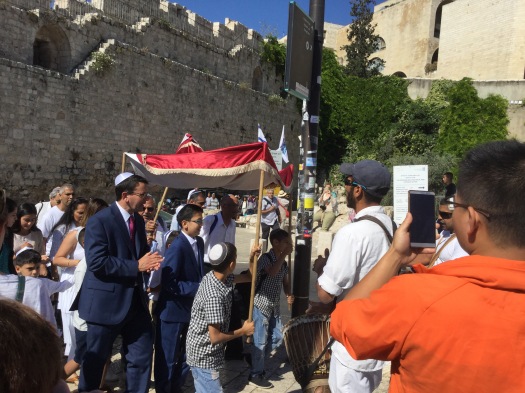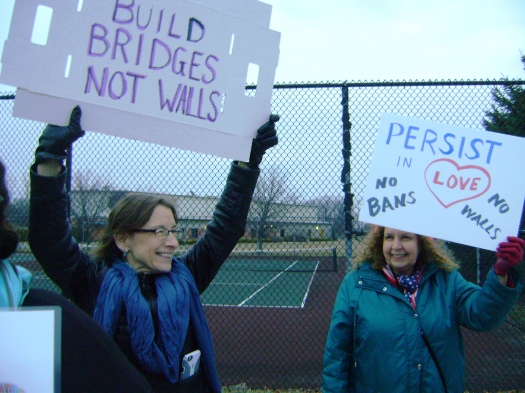No, I’m not in Gaza. The Israelis give very few people permission to enter and witness what has happened there. But our group heard from a man today who was there just days after the conclusion of the 2014 Israel-Gaza conflict which Israelis named Operation Protective Edge. Sami El-Yousef, regional director for CNEWA, Catholic Near East Welfare Association, told us about the psychosocial services his agency provided in Gaza to hundreds of children traumatized by the military assault. He maintained, however, that the conflict left all 2 million people of Gaza needing psychological services.
Sami interviewed many Gazans about the military violence they had experienced and in every case, he told us, they could not complete the conversation without both of them ending up in tears. He was so overcome by the level of psychological trauma he observed that he decided to look for some measure of the trauma these people had experienced. Using United Nations figures for the number of bombs and other munitions inflicted on Gaza during that conflict, he calculated that the people of Gaza heard one explosion every minute for 51 days.
One explosion per minute round the clock day after day. Add to that the fact that the people of Gaza cannot leave the narrow confines of their land to take refuge from the bombs. They are walled inside a strip of land 25 miles long and 7.5 miles wide at its widest point with no exits allowed them. During the 2014 conflict Israel declared half of Gaza a closed military zone and people were crowded even more densely together. Most war produces streams of refugees leaving the country, but for Gazans this was impossible. For 51 days they could not escape the walls that form what is called the world’s largest open air prison. And for 51 days the constant explosions did not even allow escape into sleep. It is no wonder that the conflict produced so much trauma. Yet the resources to meet that trauma are severely limited.
We were impressed by Sami’s account of CNEWA’s work. As a pontifical mission, it was established in 1949, intended as a temporary mission to care for the 30% of Palestinian Christians who became refugees during the 1948 war. 68 years later the refugees have not been able to return and CNEWA’s work has become long-term. They have kept a Christian presence in Israel, the West Bank, and Gaza providing healthcare, education, and social services for all Palestinians regardless of their religion.
An aside for my husband, Scoutmaster Denny Setzler of St. Ann’s Troop 339: CNEWA supports 32 Scout troops within Israel to promote Christian community amoung the Palestinian youth, providing them ways to come together to do volunteer work and socialize. I know Denny will enjoy CNEWA’s appreciation for the role scouting can play in Catholic life.
Tonight we made our way out the Damascus Gate and up the hill to the conference center Notre Dame to have dinner with Archbishop Michael Fitzgerald, retired from the Pontifical Council on Interreligious Dialogue, arranged by our delegation member Jeff Abood. The Archbishop specializes in Christian-Muslim relations and recently spent a year at John Carroll University teaching a course on the Koran and finishing a book. I hope I’ll have a chance to share our conversation in a future post.
As we left for dinner and passed through the markets of the Muslim quarter to approach the Damascus Gate we were swimming upstream it seemed. We passed through crowds of Muslims entering the old city to head to Al Aqsa mosque for the breaking of the Ramadan fast. Sundown was still more than an hour away. As we returned from dinner after dark, we encountered the festive lights for Ramadan strung all around the Damascus gate. We made our way through throngs of people celebrating the breaking of the Ramadan fast with food, music, children’s fun, and general high spirits. Even if I’d had my camera with me, I could not have captured the warm, spectacular vitalitiy of it all for you. As I sit here on the hostel terrace, I can still hear the singing at the gate at 11 pm.
Now I’ll capture a few more moments in photos.
Watching Bar Mitzvah processions pass by as we stood in line to go to the Temple Mount.


My favorite view of the old wall with Al Aqsa mosque visible on the left. We stood in line for an hour and a half to make it up to the Temple Mount to see the mosque and the Dome of the Rock.



